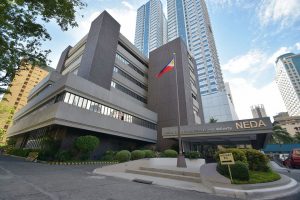




Philippines Trade Update: Imports weaken on tepid demand
 DOWNLOAD
DOWNLOAD

Policy Rate Updates: BSP outlook — cloudy with a chance of rate cut
 DOWNLOAD
DOWNLOAD

January Economic Update: Growth slows, prices rise
 DOWNLOAD
DOWNLOAD


High inflation to dampen growth outlook — NEDA

INFLATION could threaten the Philippines’ growth outlook this year and in 2024, National Economic and Development Authority (NEDA) Secretary Arsenio M. Balisacan said.
“In the next two years, strong demand for consumption and investment will primarily drive the recovery. However, domestic risks to inflation may dampen this outlook if upward price pressures force the Bangko Sentral ng Pilipinas (BSP) to raise its policy rates,” he said at a virtual roundtable forum on Wednesday.
Economic managers are targeting 6-7% gross domestic product (GDP) growth this year, and 6.5-8% in 2024.
Headline inflation eased to 8.6% in February, slowing from 8.7% in January. For the first two months of the year, inflation averaged 8.6%. The BSP expects inflation to average 6.1% this year.
The BSP has raised interest rates by a total of 400 basis points (bps) since May 2022 to tame inflation. A BusinessWorld poll last week showed 12 of 14 analysts expect the Monetary Board to hike rates by 25 bps at its meeting on Thursday.
“Given the lagged effect of monetary tightening, this policy response will likely slow down consumption and investment as consumers and investors hold off their spending and plans to expand in the coming months,” Mr. Balisacan said.
The NEDA secretary said inflation is the “most crucial issue that the government must urgently address.”
“The Philippine economy risks a slowdown as the BSP is forced to tighten monetary policy to rein in continued upward price pressures,” he added.
Earlier this month, President Ferdinand R. Marcos, Jr. approved the creation of an Inter-agency Committee on Inflation and Market Outlook.
“High inflation does hurt the economy and everyone in the long term. That’s the motivation for setting up the advisory group,” he said.
Meanwhile, Mr. Balisacan said there is a need to address constraints on investment and growth. Trade deals like the Regional Comprehensive Economic Partnership (RCEP) would only be maximized if the government improves the ease of doing business in the country, he added.
“If we don’t address these regulatory, infrastructure or property rights issues, then even with RCEP we won’t benefit much,” he said.
“RCEP will enhance our capacity to grow and sustain development, but it will be fruitless if we remain with the status quo in so far as policy, regulatory and administrative reforms. RCEP is forcing us to do these things we should have done decades ago.”
The Senate in February approved the Philippines’ participation in RCEP — the world’s largest trade deal which includes Australia, China, Japan, South Korea, New Zealand and members of the Association of Southeast Asian Nations (ASEAN). — L.M.J.C.Jocson
This article originally appeared on bworldonline.com





 By BusinessWorld
By BusinessWorld